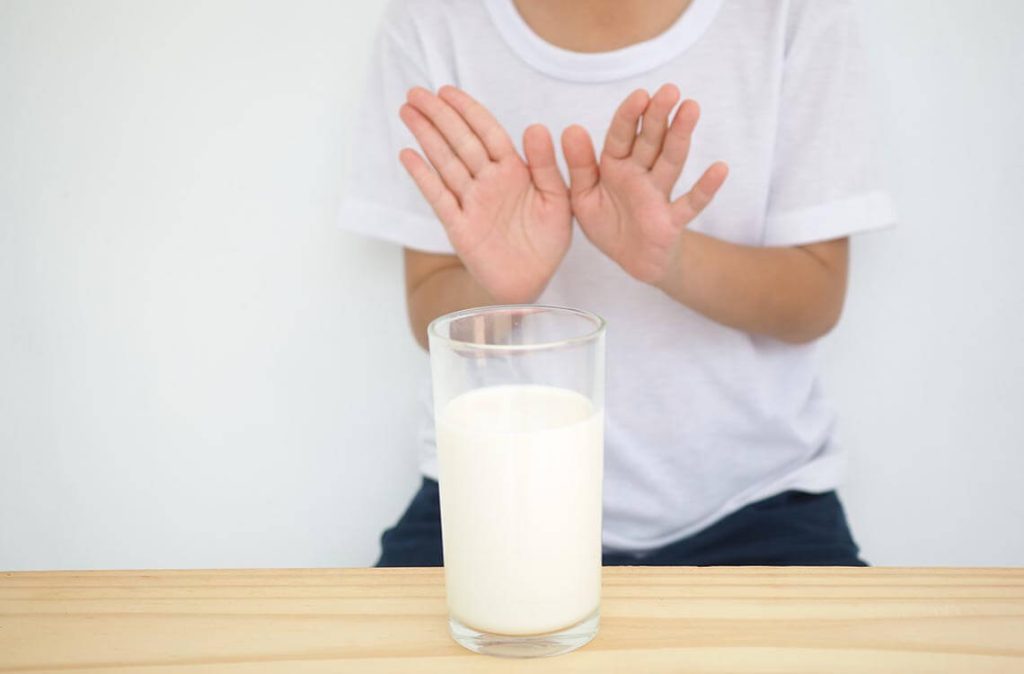As a parent, it’s important to be aware of any potential health issues that may affect your child.
One common condition that can arise during early childhood is lactose intolerance.
Lactose intolerance occurs when the body is unable to digest lactose, a sugar found in milk and dairy products.
While it can be challenging to identify lactose intolerance in toddlers, there are several signs to watch out for.
In this article, we will explore six signs that your toddler may be lactose intolerant.
But first, it’s important to remember that lactose intolerance is different from milk allergy. Read on to find out more.
Lactose Intolerance Vs Milk Allergy
Lactose intolerance is caused by the absence or insufficiency of an essential enzyme responsible for the digestion of milk sugar. Milk allergy is caused by an allergy to the protein in milk.
Milk allergy is more common among children, especially formula-fed babies as opposed to breastfed babies. Most outgrow it others don’t.
On the other hand, lactose intolerance is more uncommon, typically rare in children but more common in some people as they age.
There is no known cure for lactose intolerance but some over-the-counter lactase supplements help lessen the symptoms, allowing people to enjoy their favourite dishes like pizza and milkshake without much consequence the next day.
Lactose intolerance has both genetic and non-genetic causes.
Some conditions like irritable bowel syndrome and Celiac disease can make it more likely for you to develop lactose intolerance.
Babies who are lactose intolerance at birth will have trouble digesting breastmilk as well.
It’s important to note that lactose intolerance is different for everyone.
Some are more allergic to fresh cow’s milk but can tolerate skim or low-fat milk. Others can tolerate hard cheeses but will have trouble digesting soft cheeses.
In the same vein, some people can have very mild symptoms where they can enjoy dairy-rich food without much discomfort.
Whereas others can’t even tolerate a single drop of milk.
In this case, lactose intolerance exists on a spectrum.
That being said, the symptoms of lactose intolerance differ somewhat from milk allergy.
For instance, while both milk allergy and lactose intolerance causes gastrointestinal issues like loose stools and stomach upset, only milk allergy can cause things like skin problems (rashes), respiratory issues (asthma) and rhinitis.
That said, here are symptoms commonly found in lactose intolerance children.
5 Signs of Lactose Intolerance in Children
Frequent Digestive Issues
As mentioned, the most tell-tale sign of lactose intolerance is gastrointestinal problems.
If your toddler frequently experiences bloating, gas, diarrhoea, or stomach cramps after consuming milk or dairy products, it could be a sign of lactose intolerance.
In more serious cases, your child may also suffer from nausea, and vomiting.
In rare cases, instead of diarrhoea, lactose intolerance children and individuals can also suffer from constipation.
These symptoms occur because the lactose in the dairy products cannot be properly broken down in the body, leading to discomfort and digestive disturbances.
Persistent Crying and Irritability
Lactose intolerance can also manifest as persistent crying and irritability in toddlers.
If your child becomes fussy and inconsolable after consuming milk or dairy, it may indicate an intolerance.
The discomfort caused by the inability to digest lactose can lead to mood changes and general irritability in young children.
This is less of a symptom and more of a side effect of the symptom.
Poor Weight Gain and Growth
If your toddler is lactose intolerant, their body may have difficulty absorbing the necessary nutrients from milk and dairy products. This can result in poor weight gain and growth.
If you notice that your child is not gaining weight at a normal rate or is significantly smaller than other children their age, it is worth considering lactose intolerance as a possible cause.
Refusal to Consume Dairy
Lastly, if your toddler consistently refuses to consume milk or dairy products, it could be an instinctual response to the discomfort caused by lactose intolerance.
Toddlers may naturally avoid foods that cause them discomfort or pain, even if they are not fully aware of the underlying cause.
If your child consistently shows an aversion to dairy, lactose intolerance may be to blame.
Other Symptoms
Some people have reported very rare symptoms such as headaches, fatigue, concentration problems and eczema.
However, it’s important to rule out other underlying causes.
If your kids don’t display any other the previous symptoms, then it may not be lactose intolerance but something else.
Help Your Kids Manage
If you suspect that your toddler may be lactose intolerant, it is essential to consult a healthcare professional for an accurate diagnosis.
A doctor can conduct tests to confirm lactose intolerance and provide appropriate guidance on managing your child’s diet.
In many cases, avoiding or reducing lactose-containing foods and incorporating lactose-free alternatives can alleviate symptoms and ensure your toddler’s nutritional needs are met.
If you want, you can even introduce them to plant-based or vegan dairy sources like almond milk and imitation cheese. Some of which can ever be made in the comfort of your own home!
Recognising the signs of lactose intolerance in your toddler is crucial for their wellbeing.
By staying attentive to their digestive health, mood, growth, and other symptoms, you can identify potential lactose intolerance early on and take appropriate measures to manage their diet effectively.
With the help of a trained medical professional, your child can get a proper diagnosis as well as a complete guide for managing their symptoms.
With any luck, they may even be able to enjoy that slice of pizza with virtually no side effects.
You’ve got this, my fellow parents!
Disclaimer: The information provided in this article is for informational purposes only and should not be considered as medical advice from Motherhood. For any health-related concerns, it is advisable to consult with a qualified healthcare professional or medical practitioner.
For more insightful stories and fun recipes, stay tuned to Motherhood Story!
